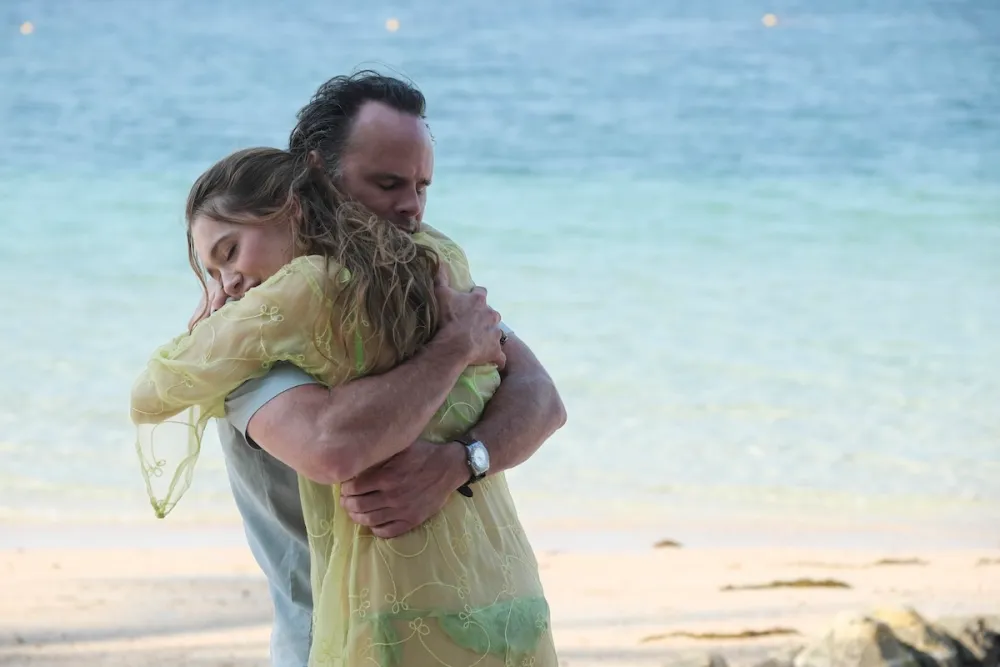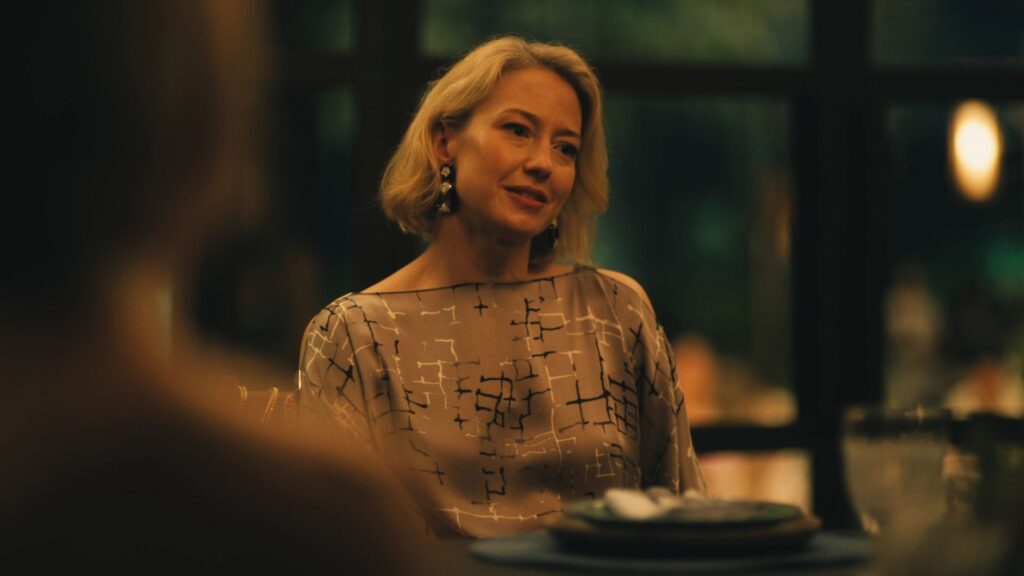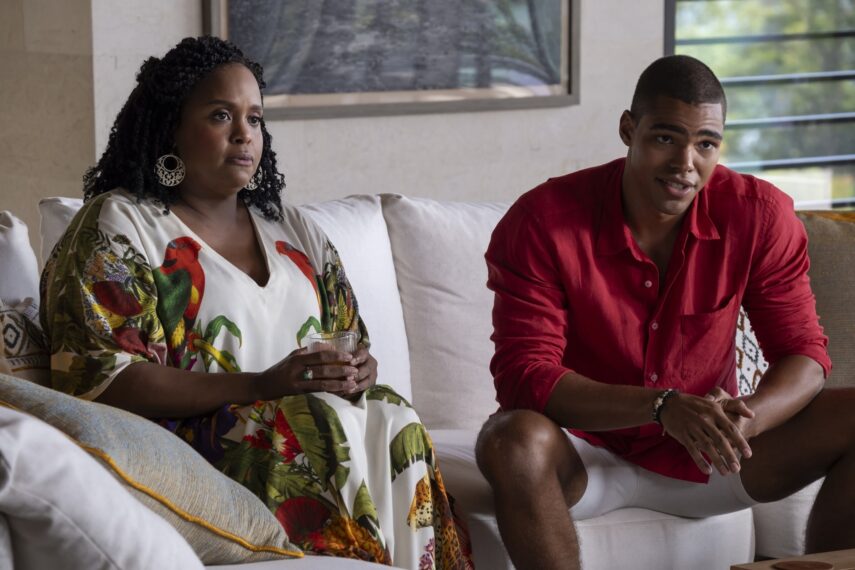
The White Lotus isn’t a murder mystery. There is no brilliant detective piecing together clues, no array of suspects telling conflicting stories, no grand reveal that exposes dark motivations or cunning conspiracies. There is, however, a dead body, the discovery of which bookends each season. The effect of this gambit, which writer-director Mike White has maintained for each of the series’ three runs, is to freight the proceedings with a suspenseful question—who’s going to die?—while still allowing him to structure the show as a rangy, acidic comedy rather than a conventional crime yarn.
This approach worked splendidly for the first two seasons of The White Lotus (both of which made my top, er, 11 in their respective years), but it yields diminishing returns for Season 3—not because White’s methodology has grown stale, but because he’s failed to properly calibrate it. For its first six (deeply enjoyable) episodes, this season operates as a dyspeptic and incisive class satire that also features tendrils of anxiety and anticipation. But in its final two installments, it squanders some of its shaggy charm, replacing it with clumsy attempts to goose tension and invite speculation.
This is partly a matter of personal taste. In analyzing television, I generally prefer reflection over prognostication; I’m more interested in what has happened than what will happen. But I’m not in the business of telling other people how to watch TV, and if you spent most of The White Lotus breathlessly theorizing about whose body would end up floating in that pond, I have no quarrel. My problem with Season 3 isn’t that viewers watched it wrong; it’s that Mike White made it wrong.

In the first two seasons of The White Lotus, the identity of the victim was virtually incidental—the result of a sad accident that had minimal impact on the pampered, cloistered lives of the surviving characters. Sure, there was a measure of intrigue—a planned robbery in Hawaii, a possible grift in Italy—but it remained secondary to the humor and the relationships.
This time out in Thailand, the threat of death looms everywhere, especially as the elongated season trudges toward its conclusion. Rick (Walton Goggins) has finally tracked down Jim (Scott Glenn), the man who killed his father, and he’s acquired a pistol from an old pal (Sam Rockwell, who earlier gives the monologue of a lifetime) for the express purpose of exacting revenge. Belinda (Natasha Rothwell) is mulling whether to accept a hush-money offer from Greg (Jon Gries), the man who previously orchestrated the murder of his wealthy wife (or at least tried to), and she fears that a misstep could provoke his wrath. Gaitok (Tayme Thapthimthong), the bumbling security guard who’s desperate to impress his crush, Mook (Lalisa Manobal), has been practicing at the gun range and is weighing the dangers of exposing the Russian hooligans who recently knocked off the hotel’s jewelry shop.
And then there are the Ratliffs, those insufferable and incestuous Carolinians whose first-world travails represent the worst of Season 3, even as they also provide some of its best moments. Most of my complaints regarding this season are restricted to its last two episodes, but the clenched anguish of Timothy (Jason Isaacs)—the white-collar criminal who learns that the authorities have seized his assets, meaning his privileged family is about to face financial and existential ruin—persists for far longer, becoming drawn out and repetitive. Over and over, the narcotized Timothy contemplates whether to kill himself and/or his loved ones, convinced that they’ll be hopeless once deprived of his largesse. (His pained conversations with his wife and son about whether they can subsist without creature comforts regrettably recall the hilarious scene in The Killing of a Sacred Deer where Colin Farrell, commanded to kill one of his children, asks their school principal which one is the superior student.) I understand that he’s conflicted, but his constant changes of mind—and the imagined executions that accompany them—grow tedious long before the finale.

The effect of this putative suspense is to minimize the show’s trenchant themes—about class schisms, white liberal guilt, the elasticity of friendship, etc.—in favor of a rather tiresome parlor game. Which piece of foreshadowing will prove genuine? Which festering emotional resentment will boil over into physical violence? Just how many of Chekhov’s guns will fire in the third act?
The good news is that this manufactured tension doesn’t nullify the excellence of this season’s first six hours, which are spiky, nuanced, and gleefully entertaining. The White Lotus is more than the sum of its noxious human parts, but the most riveting subplot here involves the triangular relationship between three longtime chums: Michelle Monaghan’s glamorous actress, Leslie Bibb’s settled housewife, and Carrie Coon’s adrift lawyer. Their conversations, which operate with a sheen of politesse that camouflages deep-seated bitterness, are a testament to White’s gift for writing characters who are nominally successful and perpetually dissatisfied. Yet he also displays shrewd insight into the younger generation: Aimee Lou Wood is lovely as Chelsea, Rick’s romantic and starry-eyed girlfriend, while Patrick Schwarzenegger is arguably Season 3’s MVP as Saxon Ratliff, the classic embodiment of toxic masculinity whose supreme confidence is derailed by a night of drug-fueled abandon.
Ideally, the finale would maintain this level of acerbic wit and piercing mockery, while also answering that semi-pressing question about the identity of the corpse. But instead, it traffics in plotty absurdity and irritating contrivance. (Be warned, spoilers follow.) Rick, seemingly at peace after having confronted his mythical tormentor the prior episode, spins out when Jim insults Rick’s mother while using conveniently oblique language about his father; unable to secure an emergency session with his spiritual advisor (who just happens to be occupied with Belinda’s son), Rick goes on a shooting spree, resulting in the deaths of several people, including the series’ one true innocent in Chelsea. It’s an awkwardly choreographed set piece that fails to supply any catharsis, especially once White confirms the (somewhat telegraphed) plot point that Jim actually is Rick’s father—a reveal lifted straight out of The Empire Strikes Back.

It’s disappointing, but it’s less execrable than what happens with the Ratliffs. After young Piper (Sarah Catherine Hook) confesses that she can’t stomach the thought of living in a Buddhist monastery because she’s too reliant on luxury, Timothy again resolves to preemptively put everyone out of their future misery—only he chooses to spare his younger son, Lochlan (Sam Nivola), who’s expressed conviction that he could enjoy a hermitic existence. What follows is yet another falsely engineered scene—involving a blender, some poisonous seeds, and homemade piña coladas—where White makes you think everyone might die before Timothy dramatically pulls back; not content with this display of vulgar manipulation, White then has Lochlan inadvertently ingest the blender’s remaining toxins, resulting in one more extended “Is he or isn’t he dead” sequence. It’s cheap fake-out upon indefensible fake-out, and it’s a bizarre misstep from such a typically thoughtful storyteller.
Not all of White’s tidying is so melodramatic. The simmering tension between our three catty gal pals is resolved over a quiet dinner, when Coon delivers a big speech about love, loss, and regret. It’s a touching scene, and Coon’s acting is powerful in a vacuum, but it also feels weirdly easy—a betrayal of the complexity that animated the trio’s affection and jealousy. As for Gaitok, he overcomes his pacifistic reservations and guns down Rick, resulting in a promotion at work and the apparent admiration of Mook; it’s a decent bit of dramatic conflict, but it also flattens Mook’s character, turning her into a shallow creature (she has a thing for tough guys, I guess?) rather than a fully-fledged person.

The only piece of the finale that really works—that satisfactorily concludes a character’s mini-arc while still conveying the show’s ideas—is the material with Belinda. Encouraged by her strapping son (Nicholas Duvernay), she demands considerably more money from Greg, who eventually acquiesces. This sudden influx of cash reclassifies Belinda in the series’ taxonomy—where she was once staff, she’s now a guest—and as a result, she abandons her nascent plans to open a spa with a fellow hotel employee (Dom Hetrakul). It’s an inversion of the devastating moment at the end of Season 1, when Jennifer Coolidge’s multi-millionaire floated the idea of supporting Belinda’s business venture, only to renege due to “complications.” (White is typically stingy with inter-season continuity, but this is one instance where closing the loop on a years-old plotline pays off.) Belinda has now realized her dream of financial independence, but she sacrificed her soul to achieve it.
That’s the kind of human tragedy that The White Lotus does best, and which this last episode otherwise struggles to provide. It’s not as if the finale wholly undermines the potency of this third season—more that it dilutes its pleasure and its power. On the whole, Season 3 of The White Lotus remains good television. But by the time it ends, it’s just another droplet of water returning to the ocean.
Season grade: B+
Finale grade: C+
Jeremy Beck is the editor-in-chief of MovieManifesto. He watches more movies and television than he probably should.
